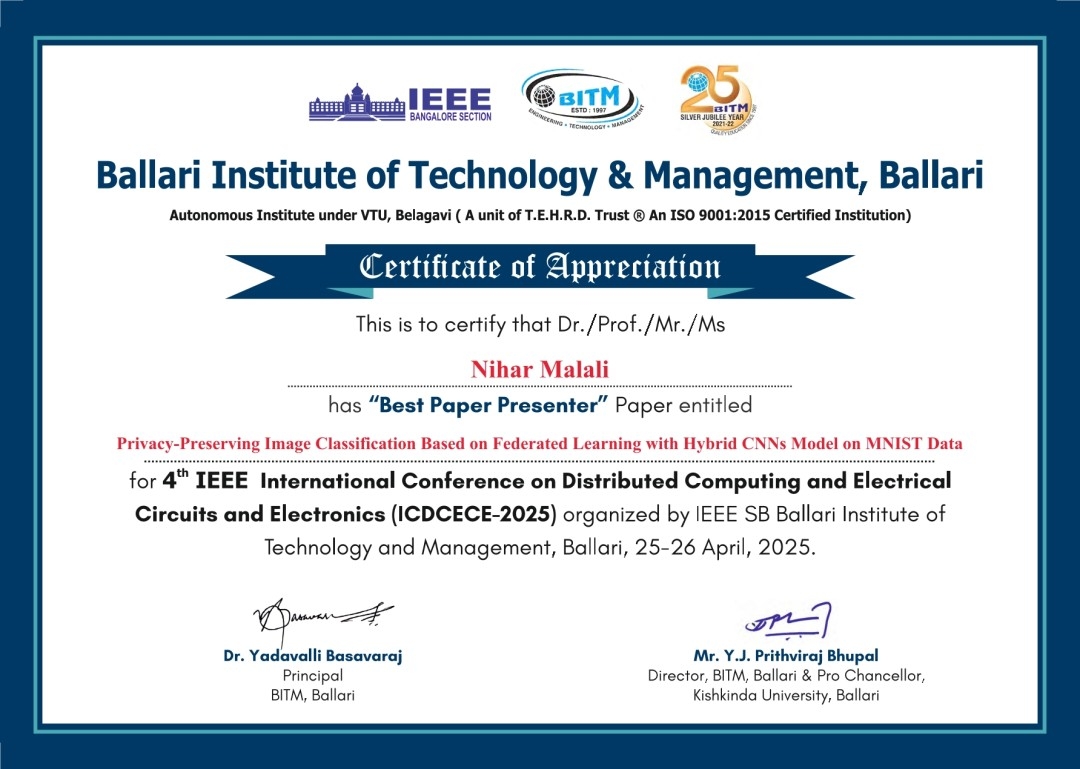
In an era where data privacy intersects intricately with technological advancement, Principal Solutions Architect Nihar Malali (effective December 2024) at National Life Group is at the forefront of innovation, receiving distinguished recognition for his contributions to artificial intelligence research. Recently honored with a prestigious academic accolade, Malali was awarded the "Best Paper Presenter" at the 4th IEEE International Conference on Distributed Computing and Electrical Circuits and Electronics (ICDCECE-2025), organized by IEEE SB Ballari Institute of Technology and Management, Ballari, from April 25–26, 2025.
The "Certificate of Appreciation," precisely worded, states: "This is to certify that Dr./Prof./Mr./Ms Nihar Malali has 'Best Paper Presenter' Paper entitled Privacy-Preserving Image Classification Based on Federated Learning with Hybrid CNNs Model on MNIST Data for 4th IEEE International Conference on Distributed Computing and Electrical Circuits and Electronics (ICDCECE-2025) organized by IEEE SB Ballari Institute of Technology and Management, Ballari, 25-26 April, 2025." This recognition was presented by Dr. Yadavalli Basavaraj, Principal, BITM, Ballari, and Mr. Y.J. Prithviraj Bhupal, Director, BITM, Ballari & Pro Chancellor, Kishkinda University, Ballari.

Revolutionizing Data Privacy with Federated Learning
Malali’s award-winning research, detailed in his groundbreaking publication, addresses a critical modern challenge—preserving user data privacy while effectively harnessing AI's power. His paper titled "Privacy-Preserving Image Classification Based on Federated Learning with Hybrid CNNs Model on MNIST Data," prominently available on ResearchGate, explores the powerful intersection of federated learning (FL) and Hybrid Convolutional Neural Networks (CNN).
Federated learning is an innovative decentralized machine learning approach where algorithms are trained across multiple decentralized devices or servers holding local data samples, without exchanging these data samples themselves. This technique dramatically reduces privacy risks, addressing growing global concerns about data security breaches and regulatory compliance.
Detailed Insights into Malali’s Research
Malali’s comprehensive research compared the efficacy of his Hybrid CNN model against several traditional neural network architectures. The Hybrid CNN architecture, specifically designed to optimize image classification performance, achieved remarkable accuracy (93.78%) on the well-known MNIST dataset, coupled with exceptionally low loss (0.0034).
This was significantly higher than traditional models, including:
-
Multilayer Perceptron (MLP): 90.37% accuracy
-
Recurrent Neural Network (RNN): 53.68% accuracy
-
Vision Transformer (ViT): 90.98% accuracy
-
VGGNet: 90.77% accuracy
This robust performance firmly positions the Hybrid CNN approach as superior in handling complex image classification tasks while maintaining strict adherence to privacy considerations.
Why Federated Learning Matters Now More Than Ever
As regulatory scrutiny intensifies and consumers become increasingly aware of their data rights, organizations across sectors—particularly in healthcare, finance, and public services—face unprecedented demands for secure data handling. Malali’s federated learning approach directly addresses this demand, allowing organizations to collaborate and improve AI models without compromising sensitive user information.
His research provides not only theoretical advancements but also practical blueprints for enterprises to adopt federated learning effectively. Malali’s methods offer enhanced predictive power without the risks associated with traditional centralized data approaches.
Bridging Theory and Real-World Application
Malali’s research integrates academic rigor with real-world applicability—a hallmark of his career trajectory. At National Life Group, his innovations span numerous AI-driven initiatives, from predictive modeling and mortality forecasting to advanced fraud detection using real-time analytics. His contributions to enterprise technology architecture, particularly in the domains of microservices, DevSecOps, and cloud solutions, have significantly enhanced business agility and data security.
These practical experiences have informed his federated learning research, resulting in highly applicable, scalable, and ethically responsible AI systems. The precision and clarity evident in his award-winning presentation clearly communicate complex ideas, underscoring his commitment to accessible, transparent technology.
Future-Proofing Through Federated Learning
The implications of Malali’s research extend well beyond the specific application demonstrated with the MNIST dataset. His federated learning approach has significant potential across various fields. For instance, healthcare institutions could collaborate securely to build robust predictive models for disease diagnosis without sharing sensitive patient records. Similarly, financial institutions can enhance fraud detection capabilities while fully complying with stringent regulatory frameworks.
His paper outlines essential considerations for future research, suggesting integration with advanced privacy techniques such as differential privacy and homomorphic encryption. Further work involving non-identically distributed (non-IID) data, larger and more complex datasets, and incorporating explainable AI (XAI) frameworks (like SHAP or LIME) for enhanced model interpretability are also emphasized.
Ethical AI: A Guiding Principle
Central to Malali’s research ethos is the pursuit of "Glass-Box AI"—transparent and explainable artificial intelligence systems. His insistence on interpretability ensures that AI decisions remain understandable, accountable, and compliant with regulatory and ethical standards. Malali champions AI systems that augment human expertise rather than replace it, fostering collaborative intelligence that enriches rather than diminishes human roles.
Industry Recognition and Broader Impact
Winning the "Best Paper Presenter" award at ICDCECE-2025 places Malali in a distinguished cohort of global technology thought leaders whose work bridges academia and industry. This accolade not only highlights his technical expertise but also underscores the broader impact of his research in guiding responsible AI adoption and data privacy stewardship.
Conclusion: A Visionary Leader Shaping the Future of AI
Nihar Malali’s recent accolade from IEEE ICDCECE-2025 is a clear testament to his pivotal role in advancing AI technology responsibly. His innovative research on federated learning and Hybrid CNN models sets a new benchmark for privacy-preserving AI systems, providing actionable insights and tools for organizations to confidently navigate the complexities of data privacy and regulatory compliance.
As AI continues to evolve rapidly, Malali's work serves as an essential guidepost for industry leaders, data scientists, policymakers, and technologists. His commitment to ethical, transparent, and secure AI ensures a future where technological advancement aligns seamlessly with human values and societal needs.
To explore further details about Nihar Malali’s work, research publications, and continued contributions to the AI domain, please visit his professional LinkedIn profile page.
Media Contact
Company Name: CB Herald
Contact Person: Ray
Email: Send Email
City:
Country: United States
Website: cbherald.com






